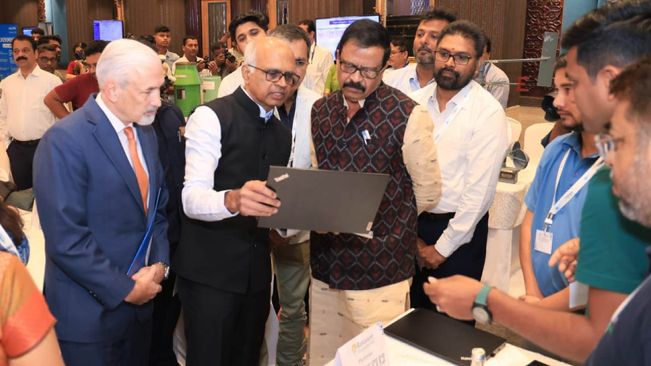The conference, titled ‘Early Warning to Early Action - A Multi-Hazard, Multi-Stakeholder Approach: Learning from Coastal Ecosystems’, is the first in a series of convenings that Reliance Foundation and the UN India are organising.
The Early Warning to Early Action convening series aims to document best practices, identify innovations, and deliver impactful policy-level outcomes to save more lives and livelihoods.
The move highlights Odisha’s leadership in the state's approaches in a disaster-prone coastal area with focus on livelihoods and gender.
The in-depth discussions also witnessed the presence of experts from state and national disaster management agencies including the National Disaster Management Authority, India Meteorological Department and Indian National Centre for Ocean Information Services, UN organisations, researchers, policy experts, academia and non-governmental organisations.
Revenue and Disaster Management Minister Suresh Pujari graced the conference as the chief guest. Speaking on this occasion, Pujari said the "Odisha government is working with various stakeholders on minimising the intensity of natural disasters."
“We are working collectively to further strengthen early warning systems and we are happy that Odisha has been chosen as the first state to start this series of deliberations," stated the Minister of Disaster Management.
"We will be working with the UN, Reliance Foundation and all other stakeholders for suggestions as well as technological assistance," he added.
Pujari also requested the organisations the government is working with "to find ways to integrate disaster prediction with information analysis for greater accuracy in early warnings.”
Addressing the issue, Jagannatha Kumar, CEO, Reliance Foundation, shed lights on the need to strengthen impact-based forecasting to ensure it translates more effectively to local action.
“As climate change drives more extreme events, there is a need to strengthen impact-based forecasting to ensure it translates more effectively to local action," he said. "We have witnessed the lifesaving potential of early warnings while serving communities during cyclones, floods and other extreme events," he added.
Kumar said that they have been driving innovative solutions in early warning systems through extensive use of technology and approaches for effective reach and impact.
Shombi Sharp, UN Resident Coordinator for India, heaps praise on the Odisha government's leadership in this major step. “We're showcasing the Government of Odisha’s leadership in Early Warning Systems for disaster response, a crucial story to tell and an opportunity to share best practices and knowledge with other states and countries in the Global South," he said.
Sharp said that the UN "remains committed to supporting these efforts" through its various agencies, working closely with the government, civil society and partners like Reliance Foundation to strengthen Early Warning Systems and build community resilience.
Experts focussed on the present advancements in early warning systems, sharing varied perspectives on challenges and ways to strengthen early action, including deliberating approaches to future-proof disaster preparedness in the panel discussions ‘Current State of EWS and Early Action: Assessing effectiveness’ and ‘Future Proofing and Innovation towards Integrated Early Warning System’.
The discussions focussed on learnings from recent implementation of early warning systems in coastal states, youth and gender-led disaster risk reduction initiatives and integration of livelihood protection along with early warning systems.
The panellists also reflected on pre-convening field visits to villages in Balasore and Bhadrak districts to see the work of Reliance Foundation and the UN India, in collaboration with the administration.
read more Odisha News















